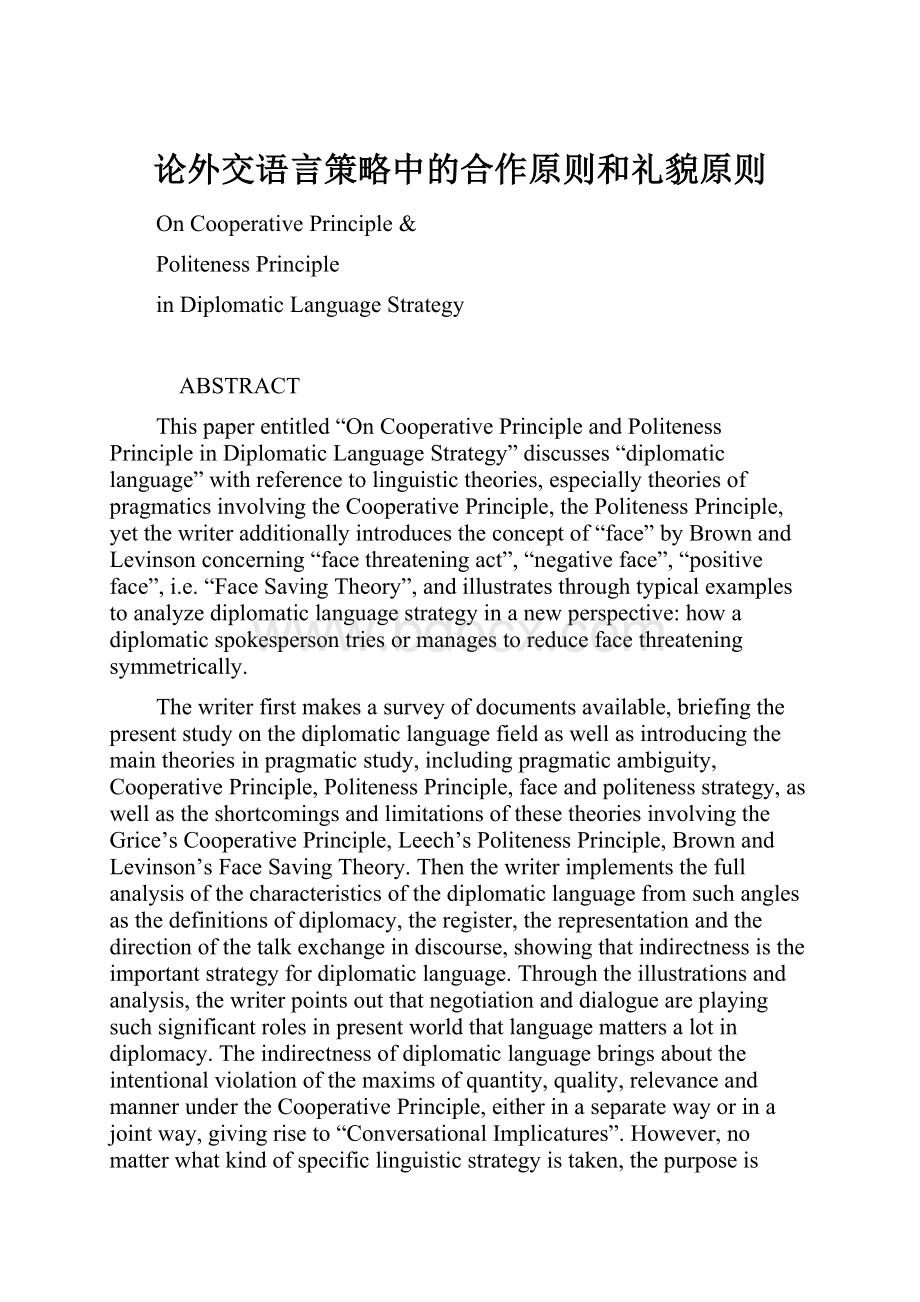论外交语言策略中的合作原则和礼貌原则Word下载.docx
《论外交语言策略中的合作原则和礼貌原则Word下载.docx》由会员分享,可在线阅读,更多相关《论外交语言策略中的合作原则和礼貌原则Word下载.docx(42页珍藏版)》请在冰豆网上搜索。

Thewriterfirstmakesasurveyofdocumentsavailable,briefingthepresentstudyonthediplomaticlanguagefieldaswellasintroducingthemaintheoriesinpragmaticstudy,includingpragmaticambiguity,CooperativePrinciple,PolitenessPrinciple,faceandpolitenessstrategy,aswellastheshortcomingsandlimitationsofthesetheoriesinvolvingtheGrice’sCooperativePrinciple,Leech’sPolitenessPrinciple,BrownandLevinson’sFaceSavingTheory.Thenthewriterimplementsthefullanalysisofthecharacteristicsofthediplomaticlanguagefromsuchanglesasthedefinitionsofdiplomacy,theregister,therepresentationandthedirectionofthetalkexchangeindiscourse,showingthatindirectnessistheimportantstrategyfordiplomaticlanguage.Throughtheillustrationsandanalysis,thewriterpointsoutthatnegotiationanddialogueareplayingsuchsignificantrolesinpresentworldthatlanguagemattersalotindiplomacy.Theindirectnessofdiplomaticlanguagebringsabouttheintentionalviolationofthemaximsofquantity,quality,relevanceandmannerundertheCooperativePrinciple,eitherinaseparatewayorinajointway,givingriseto“ConversationalImplicatures”.However,nomatterwhatkindofspecificlinguisticstrategyistaken,thepurposeiseithertoreducethefacethreatto“other”ortoreducethefacethreatto“self”ortoboth.Inotherwords,thegoaliseithertomaintainthefaceto“other”orto“self”ortobothorallsidesinvolved.Moreover,thewriterillustratessomeotherdiplomaticlanguagestrategiesincludingpolitenesstoathirdparty,guardedunderstatements,politenessshift,etc.tofurtherelaboratethatthefacethreatreductionorfacesavingisnotonlymono-directional,i.e.other-oriented,butalsobi-directionaloreven“self”-orientedinsomespecificconditions,justbecause“self”occupiesasignificantpositionindiplomaticsituations.Inaddition,thethirdpartyisalsoafactortobetakenintoconsideration.Hencethepolitenessisneithersoabsolutenorsoasymmetricalsofarasthediplomaticlanguagestrategyisconcerned.ThewriterconcludesthatthemaximsunderPolitenessPrinciplearesoasymmetricallyother-orientedthatitmaynotaccountforthefeaturesofdiplomaticlanguage.ItcanonlysolvepartoftheproblemsthatareunsolvedbytheCooperativePrinciple.
Finally,thewriterwindsupthewholepaperbyadvancinganInterestPrinciplethatmaymatterinthediplomaticlanguagestrategythroughadjustmenttoTactMaxim(Minimizecosttoother;
maximizebenefittoother)underLeech’sPolitenessPrincipleforfurtherdiscussion.
MaximofInterest:
Minimizecosttoothers;
maximizebenefittoself.
Inthemaxim,“others”indicatesnotonlythe“hearer”,butthepartiesexceptfor“self”.Thewriterholdsthatitisaparallelandsimultaneousprocess,ortheyarepremisestoeachotherbasedonspecificconditiontoachieveatrade-offintheend.
KeyWords:
CooperativePrinciplePolitenessPrincipleConversationalImplicaturefacethreateningactnegativefacepositivefacefacesavingdiplomacydiplomaticlanguagestrategy
内容摘要
本文“论外交语言策略中的合作原则和礼貌原则”从语用学理论的角度探讨了外交语言的特点。
这些理论包括格莱斯的会话合作原则和利奇的礼貌原则。
作者还特地介绍了布朗和莱文森的面子保全论,涉及“面子威胁行为”、“消极面子”、“积极面子”、“面子保全”等方面。
通过列举并分析典型事例,作者从新的视角分析外交人员怎样运用外交语言策略从而平衡地减少对各方的面子威胁。
作者首先给出中外文献查阅结果,概括外交语言在语言学领域研究的现状,还简要概述了语用领域的主要理论,包括语用学和语用模糊,合作原则,礼貌原则,面子和礼貌策略理论等并指出这些理论的不足之处—不对称性,以他方为导向等。
接着作者从外交的定义,外交语言语域,会话者所代表利益,会话方向等角度对外交语言的特点作了全面分析,指出间接性是外交语言的重要策略,也就是对合作原则之下之数量准则,质量准则,关联准则,方式准则之一个或数个准则的故意违反从而产生字面意义之外的会话含义。
作者通过具体典型事例说明准则违反的原因在于言者的意图,即尽量减小对他方,对己方,或对双方的面子威胁;
换而言之,就是尽量维护他方,己方或双方的面子,包括各方的积极面子和消极面子,而不仅仅只考虑他方。
作者同时列出有关语用领域的其他外交语言策略包括对第三方礼貌,委婉语,礼貌位移等,进一步说明在外交语言策略中,“己方”地位占重要分量,第三方也是需要考虑的因素。
由于在外交领域,面子与利益之间成正比关系,因此维护了面子也就维护了国家利益,而外交的目的就在于维护各国之间和谐关系,获取利益,谋求双赢或共赢。
鉴于此,作者将利奇的礼貌原则之下的最重要准则“策略准则”即“(a)使他人受损最小,(b)使他人受惠最大”调整为“利益准则”以供进一步探讨。
在外交语言策略中利益准则似乎更能体现外交语言策略的特性:
利益准则:
使他人受损最小,使自己受惠最大。
看似一对矛盾,而解决这个矛盾正是外交之意义所在。
典型事例说明有折衷途径。
两者为并列关系,互为前提,共同作用,谋求双赢或共赢。
关键词:
合作原则礼貌原则会话含义面子威胁行为消极面子积极面子面子保全外交外交语言策略
TABLEOFCONTENTS
Acknowledgements………………………………………………………….….……...i
Abstract(English)………………...………………………………………………..….ii
Abstract(Chinese)…...……………………………………………………….……….iv
TableofContents…………………………………………………………….……….vi
Chapter1AGeneralSurvey…………...…….…………..…..……………………11.1StudiesonDiplomaticLanguage………………………………….……...1
1.2PurposesofThisPaper..……………….………………………….………5
1.3StructuresofthePaper……………………………………….…….……...6
Chapter2DiscussionsofMainTheoriesInvolved…………………….………..…8
2.1PragmaticsandPragmaticVagueness……………………….…………....8
2.2CooperativePrinciple…………………………………………….…….....9
2.3Politenessprinciple…………………………………………….………..12
2.4FaceandPolitenessStrategies………………………………….……….14
2.5DiscussionsonAbove-MentionedTheories…………………….………16
Chapter3Diplomacy&
FeaturesofDiplomaticlanguage……….…….…...…..20
3.1Diplomacy……………………………………………………….….…...20
3.2FeaturesofDiplomaticlanguage……………………………….…….…23
3.2.1Register……………………………………………….…….…23
3.2.2Representation……………………………………….……..….24
3.2.3DirectionofTalkExchange………………………….……..….25
Chapter4CooperativePrinciple&
PolitenessPrincipleinDiplomaticLanguageStrategy……………………………….………………………………..….….……….27
4.1ViolationoftheMaximofQuantity……………………….…….………28
4.2ViolationoftheMaximofQuality………………………………..……..29
4.3ViolationoftheMaximofRelevance…………………………..….……31
4.4ViolationoftheMaximofManner……………………………….….….33
4.5SimultaneousViolationsofMaximsunderCooperativePrinciple……..36
4.6GuardedUnderstatement……………………………….…………..……40
4.7PolitenessShift…………..…………………………………………...….42
4.8PolitenesstoaThirdParty…………………………………………..…..43
Chapter5Conclusion………………..……………………...………………..……48
Bibliography……………………………………………………………………..…...50
Appendix……………………………………………………………………….…….52
Chapter1AGeneralSurvey
1.1StudiesonDiplomaticLanguage
DuringfruitfulstudyoftheoryofpragmaticsinAnhuiUniversity,thewriter,whohasbeenworkingasaninterpreterandtranslatorinaninstituteformorethanfifteenyears,doubtswhetherGrice’sCooperativePrincipleandLeech’sPolitenessPrincipleaccountforthefeaturesofthediplomaticlanguage,whethertheyholdtruefordiplomaticlanguagestrategy.So,thewriterhasconsultedboththeimportedanddomesticliteratureavailable,includingJournalofLinguistics,JournalofPragmatics,theInternet,etc.Itisquitedisappointingthatnoarticlesarefounddiscussingthespecifictopicofdiplomaticlanguageintheperspectiveofpragmatics,say,CooperativePrincipleandPolitenessPrinciple,despitethefactthattherearemagnitudesofarticlesdealingwitheitherdiplomacyorpragmaticsseparately.
Thestudiesondiscussingtheambiguitiesinlanguageusearealsosurveyed.WithinJournalofLinguistics,amongpaperspublishedfrom20yearsagouptonow,thereisonearticleentitled“PurposiveVagueness:
anevaluativedimensionofvaguequantifyingexpressions”byMavaJoPowell(1985:
31).Thearticleshowsthatsomevaguequantifyingexpressionsmayencodeaspeaker’sjudgment.
Onetypicalbook,entitledVagueLanguage,writtenbyJoannaChannell(1994)discusses“whatisvaguelanguage”,“theoryandmethodologyofthestudyofvaguelanguage”,“approximatingquantitieswithnumbersandapproximators”,“approximatingquantitieswithroundnumbers”,“approximatingquantitieswithnon-numericalvaguequantifiers”,“referringvaguelytocategories”,and“theuseofvaguelanguage”,etc.Channellpointsoutthatthoughforalongtime,“explicitness”and“precision”arethecriteriathatshouldbeobservedbothinspeakingandwriting,yetvirtually,thevaguelanguageappearshereandthere,timeandagain.Thebookstresseson3categoriesofvaguephenomenon:
1)theaddedwordsorexpressioninfrontofanexplicitexpressionsothattheexpressionasawholebecomesmoreorlessvague;
2)thewordsorexpressionthemselvesarevague;
3)theimplicaturesandentailmentsofvagueexpression.Inaddition,Channellcitesagreatnumberofexamplestoillustrateandanalyzethesourceandnatureofthevagueness.Channellholdsthatsomepurposiveusesofvaguelanguagelieindeliberatewithholdinginformation,usinglanguagepersuasively,self-protection,powerandpoliteness,etc.Channellwrites“vaguenessisusedasonewayofadheringtothepolitenessrulesforaparticularculture,andofnotthreateningface”(ibid:
190),nomorerelatedelaborationisgiveninthispoint.
Comparatively,thedomesticliteraturearemoreencouraging.Whenclicking“外交语言”or“外交辞令”asthetitleorkeyword,thewriterfindsthatinthe“ChineseJournalNetDataBase”,thereareabout15relatedarticles,andthesurveyindicatesthatmostarticlessearchedarediscussing“diplomaticlanguage”intheaspectofconventionalrhetoric,i.e.ambiguity,fuzziness,punorlogicetc.,andonlyafewofthem(see马莉,2003:
21-4;
黄强&
梁颖,2004:
119-22;
零宏惠,2000:
99-103;
零宏惠,2004:
137-42)discussthediplomaticlanguageoritsstrategyfromthepragmaticpointofview,